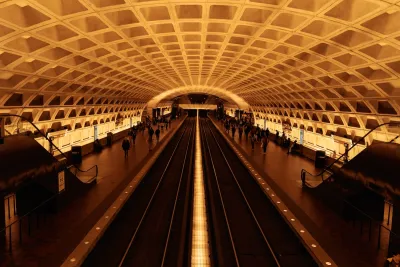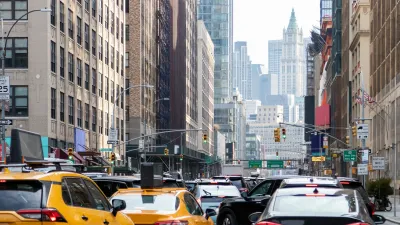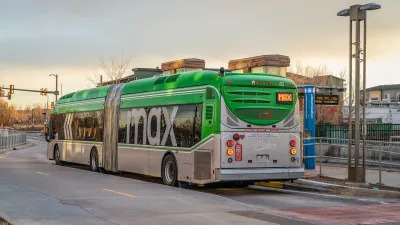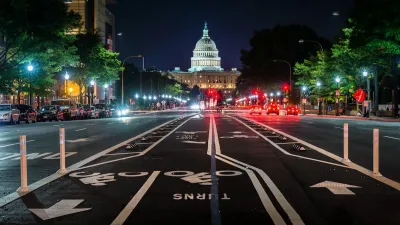High-profile projects like New York City congestion pricing, California high-speed rail, and major transit agencies face drastic federal funding cuts.

The U.S. Department of Transportation (USDOT) is threatening multiple major transit agencies with a loss of funding, reports Benton Graham in Grist. In letters to the New York and Washington, D.C. transit agencies, Transportation Secretary Sean Duffy cited security concerns as a reason for potentially pulling federal funding. Duffy threatened to withhold what amounts to roughly 20 percent of New York MTA’s budget for major infrastructure in federal funding. However, Graham points out that “Major crime is down 29 percent compared to last year on New York City’s subways and buses.”
According to Graham, “Duffy has already hinted at targeting other cities, adding the Chicago Transit Authority to the list of public transit agencies that could be in danger in an interview on Fox News.”
These cuts could result in “millions of tons of unnecessary annual carbon emissions over the coming decades” as the administration pulls funding for projects already underway, an uncommon move. “The moves represent an emerging pattern in the DOT’s approach to transportation under President Donald Trump: target the highest-profile climate-friendly programs in states with Democratic leadership,” Graham notes.
USDOT is also taking aim at New York’s congestion pricing program and California’s high-speed rail (HSR) project, threatening to pull federal funding while simultaneously promoting privatized HSR.
FULL STORY: How the Trump administration is targeting green transportation in blue states

Trump Administration Could Effectively End Housing Voucher Program
Federal officials are eyeing major cuts to the Section 8 program that helps millions of low-income households pay rent.

Planetizen Federal Action Tracker
A weekly monitor of how Trump’s orders and actions are impacting planners and planning in America.

Ken Jennings Launches Transit Web Series
The Jeopardy champ wants you to ride public transit.

Crime Continues to Drop on Philly, San Francisco Transit Systems
SEPTA and BART both saw significant declines in violent crime in the first quarter of 2025.

How South LA Green Spaces Power Community Health and Hope
Green spaces like South L.A. Wetlands Park are helping South Los Angeles residents promote healthy lifestyles, build community, and advocate for improvements that reflect local needs in historically underserved neighborhoods.

Sacramento Plans ‘Quick-Build’ Road Safety Projects
The city wants to accelerate small-scale safety improvements that use low-cost equipment to make an impact at dangerous intersections.
Urban Design for Planners 1: Software Tools
This six-course series explores essential urban design concepts using open source software and equips planners with the tools they need to participate fully in the urban design process.
Planning for Universal Design
Learn the tools for implementing Universal Design in planning regulations.
Heyer Gruel & Associates PA
Ada County Highway District
Institute for Housing and Urban Development Studies (IHS)
City of Grandview
Harvard GSD Executive Education
Toledo-Lucas County Plan Commissions
Salt Lake City
NYU Wagner Graduate School of Public Service





























